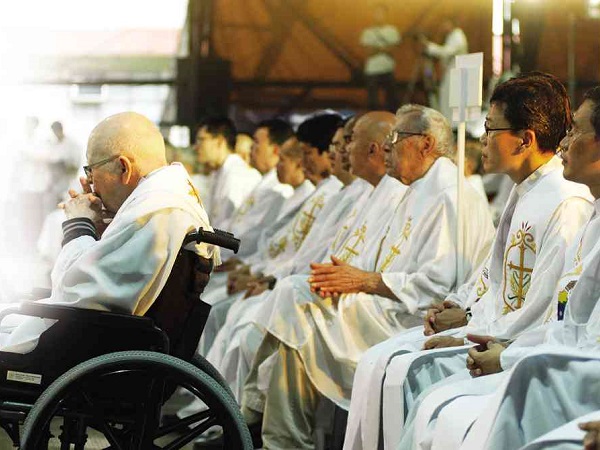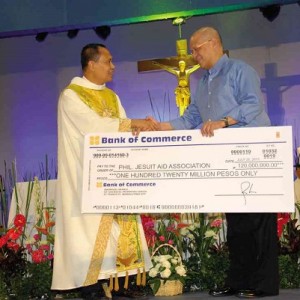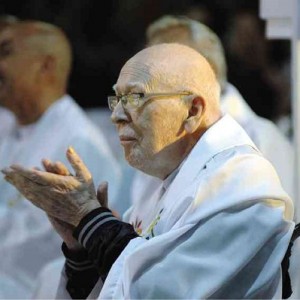It’s not all acquisitions for tycoon Ramon Ang; giving back in a big way is important, too
Yes, the Society of Jesus—more commonly known as the Jesuits—is relatively more affluent than other religious orders.
This is due, in part, to their network of friends and supporters around the world, which is generally composed of the upper crust of their respective societies. Because of this, the order founded by a Basque nobleman in 1540 has financial resources that are the envy of all but a few other groups in the Catholic church.
This is not to say, however, that their money is infinite.
In fact, newly designated Provincial Superior of the Jesuits‘ Philippine province concedes that the group’s resources are being strained by the soaring cost of providing medical care for its elderly priests.
“A number of Jesuits are getting older and older, and quite a number of them are ill right now,” Fr. Antonio Moreno S.J. tells SundayBiz.
Naturally, the Jesuits are committed to caring for their elderly members—whether the priests are local or foreigners— as all of them have dedicated their entire lives to uplifting the lives of Filipinos nationwide.
But caring for them means investing in medical care and facilities that run into the millions of pesos—a level of strain that even the wealthiest of religious orders need help with.
Enter businessman Ramon S. Ang.
During the Mass to celebrate the feast day of St. Ignatius of Loyola last week, Fr. Moreno announces to the assembly that Ang—the president of conglomerate San Miguel Corp.—will donate P120 million of his personal funds to the local Jesuit community for it to build a new infirmary where its elderly and ill priests can receive the best medical care available.
The new facility will be a multi-story affair built adjacent to the Loyola House of Studies on the Ateneo de Manila University campus in Loyola Heights, Quezon City.
Fr. Moreno says its planned 30 rooms will be a quantum leap from the present facilities used by elderly Jesuits: a simple two-room clinic.
“Our facilities right now are insufficient to meet our needs, so this new facility will be a big help for us,” he says.
According to the chief of the Philippine Jesuits, the facility—tentatively dubbed a “health and wellness center”—will cater to priests who will be on “assisted living,” those who require 24/7 medical attention, or even those with less serious health problems.
Elderly Jesuits based in the provinces may also be flown and relocated to Manila for centralized health care, he says.
Last week, Ang turned over the first tranche of his donation to the Jesuits in the form of a P60-million check, with the second tranche to follow once construction is underway.
Fr. Moreno says they plan to break ground for the facility by December this year, with construction to go into full swing by January 2014 and completion expected after a year.
“Mr. Ang’s donation frees up [some of our resources],” he says, discussing the costs associated with caring for the Society’s members.
This is, of course, not the first donation that Ang has made to the Jesuits in a personal capacity. Last year, the businessman made a very low key donation to Xavier School for a new gymnasium in the school’s new campus in the Nuvali community in Sta. Rosa, Laguna.
Ang declines to reveal how much he donated, but the cost of the new “Ramon S. Ang Gymnasium” is rumored to be over P70 million.
As the head of the country’s largest conglomerate, Ang has also given new impetus for San Miguel Corp.’s corporate social responsibility thrust.
Under his guidance, San Miguel donated P500 million last year to Gawad Kalinga for the group to build 5,000 homes in the cities of Cagayan de Oro and Iligan in the aftermath of Typhoon Sendong.
That amount was the single biggest donation made by a Philippine company in local corporate history—a feat made more astounding by the fact that San Miguel’s total CSR donations for 2012 hit almost P1 billion.
Recently, the conglomerate has also laid out an ambitious plan, with Ang’s prodding, to have a more systematic program for its CSR activities. Special emphasis will be given on initiatives in the sphere of education.
As for the Jesuits, it looks like the start of a long relationship with Ang (who is not an Ateneo alumnus, although his children are).
“We hope that this partnership continues,” Fr. Moreno says. “[Mr. Ang] is very pleased with it, and we gave him the proper recognition.”
During the mass where he was recognized, Ang himself had few words, but was visibly happy with the affair.
“The Jesuits are excellent priests and educators,” he says. “I will continue to help them. Whatever they need.”
Enough said.



